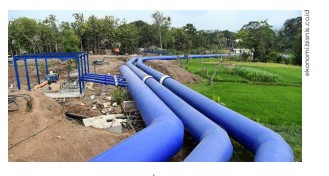
The Coordinating Minister for Human Development and Culture (PMK), Muhadjir Effendy, demanded that sanitation improvements in Papua be carried out immediately. This is because poor sanitation is a source of disease experienced by the community. Diseases that need to be watched out for in Papua include acute respiratory infections (ARI), malaria, HIV/AIDS, leprosy, stunting, and Covid-19.
“I have asked for an improvement in environmental sanitation, including the MCK (shower and wash toilet). I also agree that there are already public/communal MCKs here, one MCK for five families,” Muhadjir said during a working visit in Keroom Regency, Papua, Thursday (9/9/2021), as quoted from https://sanitariankit. id /. “I think it is good enough, but most importantly I remind you that there is a responsibility to clean it up, don’t get it squalid, don’t get it filthy,” he said.
Muhadjir said that based on reports from the Arso Timur Health Center, Keroom Regency, cases of ARI in the area in 2020 reached 913 cases. Then, malaria (845), myalgia (450), febrile observation or which can be an early symptom of dengue fever and typhus (293), gastritis (226), diarrhea (66) and hypertension (61). Muhadjir said that environmental hygiene and sanitation problems could be one of the triggering factors for these various diseases.
“The existence of adequate MCK is very much needed to deal with disease problems, especially in terms of prevention,” Muhadjir said. Previously, during the visit, Muhadjir also visited the Jayapura City Hospital. There, he ensures basic services such as the handling of tuberculosis (TB), HIV/AIDS, and other diseases. Muhadjir also hopes that in the future, public health services are expected to further improve.
Government Builds Clean Water and Sanitation Infrastructure The Ministry of Public Works and Public Housing (PUPR), quoting https://kiprah.pu.go. id/, has programmed infrastructure development both in the short and medium term to improve the quality of life of the people in Asmat Regency, Papua Province. The provision of clean water and sanitation is a priority because Asmat Regency is a swamp area that has a problem with clean water.
In Agats District, which is the capital of Asmat Regency, three rainwater reservoirs will be built with a capacity of 1,000 m3 each. From the reservoir, it will be distributed to public hydrants close to residential areas. One of the reservoirs will be built near the Agats Regional General Hospital (RSUD). In Fayit District, a rainwater reservoir has been built and Atsj District has rehabilitated a 500 m raw water pipeline and a new 5.6 km network was constructed.
For sanitation, the PUPR Ministry will provide communal toilets and communal septic tanks complete with rainwater collection systems. These facilities will be located at public facilities and social facilities such as schools and health centers. As many as 8 units each of Communal MCK will be distributed in five districts, namely in the Districts of Agats, Atsj, Pantai Kasuari, Awyu, and Fayit. As for the Communal Septic Tank, 100 units will be built in the Agats District.
For waste processing, the Ministry of PUPR has built a community-based Reuse, Reduce, and Recycle (TPS3R) Waste Management Center (TPS-3R) in Agats District. In addition, three waste transport motorbikes were also handed by Minister Basuki to the Chairman of the Asmat Regency DPRD, Yusak Bokowi as assistance for the community to be more concerned about managing waste. A total of 100 dry waste baskets and garbage will also be placed around residential areas in Agats District.
Water, Sanitation and Hygiene (WASH) Program in Mimika
In November 2019, PT. Softex Indonesia committed with UNICEF for young women to practice menstrual hygiene. In the next three years, Softex will support the Water, Sanitation and Hygiene (WASH) program including Menstrual Hygiene Management (MKM) in remote areas, especially in Papua, West Papua, South Sulawesi and East Nusa Tenggara. Mimika Regency in Papua was the first location to receive support from this program.
Many schools do not have adequate toilets and access to clean water. This condition affects the quality of learning because students often do not go to school due to illness as a result of poor sanitation and some even have to go home during school hours because there is no toilet in their school. UNICEF, in collaboration with the Mimika District Government, District Education Office, District Health Office, Bappeda, and the Papuan Health and Education Development Foundation (YP2KP) runs a School Sanitation Program in 15 elementary schools.
The main goal is to provide sanitation facilities in a clean and healthy school environment. In addition, it aims to increase awareness among students in schools to have a healthy and clean lifestyle, making them agents of change for the WASH program. Another objective is to increase the capacity of schools to have good water treatment and sanitation facilities. Moreover, improve local regulations and plans of the Mimika Government to provide clean water, sanitation and hygiene in schools.
Building health components and infrastructure in the land of Papua requires the contribution and support of all parties. This is because Papua is the largest province with a very different field and culture as compared to other regions in Indonesia.